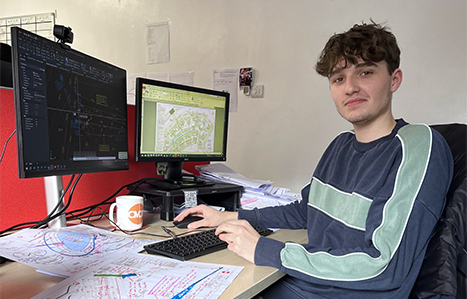How to Find your First Apprenticeship
We asked Exeter College Digital Marketing Apprentice Ella Hymans for her top tips getting your first Apprenticeship.
If you’re considering an Apprenticeship or know someone who is, then this article contains tips and tricks for the best chance of success. With this information you will know what to do at every stage and feel confident of a positive outcome.
Finding an Apprenticeship
This can seem daunting at first but it’s actually very similar to applying for a job. To start an Apprenticeship you need two things:
- An Employer
- A Training Provider (such as Exeter College where I work).
Step One: Finding an Employer
While finding someone to employ you as an Apprentice fundamentally is up to you, there is a lot of help out there to get you where you want to be.
One way to find an employer to take you on as an Apprentice is through Apprenticeship and job websites. There is the National Apprenticeship website run by the government where employers across the county can list their Apprenticeship vacancies. Exeter College also has a specialist page where we list vacancies from the 100s employers we currently work with. You can also look on normal job vacancies websites like Indeed or LinkedIn.
Tip: Another way to find an employer to take you on as an Apprentice is talking to friends, family and any contacts you know. Even if these contacts can’t get you an Apprenticeship, they may be able to procure you some valuable work experience to build up your CV.
Any work experience you can get in businesses will be incredibly helpful when it comes to apply for job vacancies as companies will often value real world experience.
Finally, to find an Employer to take you on as an Apprentice you can go into the company and ask them! Employers love to see young people taking initiative as it shows a passion and real willingness to have that job.
Therefore, if a company is not advertising, there is nothing to stop you going in with your CV and a cover letter to ask them to consider taking you on. I would recommend actually going into a business to give them your CV rather than sending an email, as emails are often ignored and going into the company will make it harder for them to ignore you or turn you away.
Tip: If you are nervous about asking for an Apprenticeship, a good way to get your foot in the door is to ask for some work experience, and then at the end of that bring up the possibility of an Apprenticeship. The worst the company is going to do is say no and you’ve got yourself some valuable work experience to add to your CV.
Manage your expectations
An Apprenticeship is a job and therefore unlike applying to a College, you may not get the first one you apply for. You may be competing against several other people going for the same job and it will be unlikely you get the first one you apply to. Personally, I applied to around 30 positions before I got my Apprenticeship. So you shouldn’t feel disheartened if it is taking a long time, it is a process and you will eventually find the right position for you with the right team of people.
Tip: Job interviews especially can be as much to do with how you fit in with that team as how well you could do that job. Sometimes, if you’ve haven’t been hired for a job, it might be for the best as it may not have been the right workplace for you.
Create an irresistible CV
When you are applying for lots of jobs it can be very tempting to send off the same CV to everyone. However, it is really important that you tailor your CV to the job you’re applying for. You may not think they will know, but employers can tell when they receive a generic CV as opposed to a tailored one. This is because they may receive 50 CVs for the same job so it’s easy to spot who has made the effort. It will take time and it will be frustrating – I would know, I changed mine 30 times – but it will be worth it in the end because it will help you get employed.
If you do get an interview make sure you are early, so as to not be stressed, and dress smartly and professionally. I have actually written a blog specifically on interview tips so if you want to know more you can read it here. But just make sure you have prepared some answers to questions you may be asked beforehand, so you go into the interview feeling as comfortable and confident as possible.
Step Two: Finding a Training Provider
When you have secured your perfect job it’s time to enrol with a training provider. For example, at Exeter College the first stage is to call and speak to a Training and Recruitment Adviser whose job it will be to enrol you on your College course.
You will then come in for an interview with the person leading the course. This won’t necessarily decide whether you can do the course, it’s more to determine if you will need any extra support and to give you a chance to ask any questions you may have about the College side of your Apprenticeship.
Once you have completed the interview, your Training and Recruitment Adviser will come out to your workplace so that you and your employer can fill in some paperwork to enrol you as an Apprentice. This will likely be a similar method to other training providers but if you are at all concerned or confused about the process, contact your provider and talk it through with them.
If you have any questions about this or need help with CV writing or searching for vacancies, you are more than welcome to contact the Exeter College Apprenticeships Team at any time and they will talk you through anything you are concerned about.
Email: Apprentices@exe-coll.ac.uk
Phone: 01392 400800



